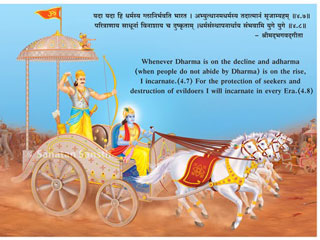Only if the lifestyle of society is based upon Sanatan Dharma, the Nation will become prosperous and immortal !
 1. Importance of Dharma
1. Importance of Dharma
Life without Dharma is akin to life without oxygen, that in other words is being as good as dead. Dharma is the soul of a jiva. Reaching a stage where the eternity of the soul is understood is itself reaching a stage of Moksha. Life without Dharma is indicative of a transient state. It imparts happiness and sorrow to the jiva, but eternity confers pure Anand.
Radiance of Dharma is called Aditej (Primordial radiance). The concept of Dharma remains steady even after the processes of Creation, Sustenance and Dissolution. Since the perceptions of Brahman are steady, it has no fear of Dissolution. Hence, Hindu Dharma is without a beginning and has no end too; meaning, it is full of knowledge.
Dharma is meant for social evolution along with self-upliftment. Today’s society is ailing. Rampant corruption, hooliganism, etc. are the symptoms of this ailment. The cause for this ailment is the decline in the sattvik (Sattva predominant) nature of the society due to the absence of spiritual practice and an increase in the proportion of evildoers who have a Raja-Tama temperament. The only cure is to impress the concept of appropriate spiritual practice upon the social mind and motivate the society to oppose injustice.
2. Dharma does not mean religion
There is no appropriate equivalent word for Dharma in the English language. The word ‘religion’ is derived from the word ‘relegate’. To ‘relegate’ means sending to a lower level. As per this meaning, religion would mean the one which sends us to a lower level; hence, this word itself is inappropriate. On the contrary, Dharma is one which elevates us to a higher plane. The word ‘Dharma’ is used with different meanings in different Holy texts.
Quotes such as ‘One cannot live without religion’ and ‘Religion is the opium of the people’ are contradictory and create confusion in the minds of ordinary people. When we talk about Dharma (Righteousness), most people relate it to words such as Hinduism, Islam, Christianity, Buddhism, etc. Others think that, since India is a secular state, religion is an untouchable topic.
According to Shri Shankaracharya : Dharma is that which accomplishes the three tasks of keeping the setup of the society in excellent condition, bringing about the worldly progress of every living being, and facilitating their progress in the spiritual realm as well. We understand from this definition the vastness of Dharma and its extraordinary importance in human life.
In the context of a Nation, Dharma is its life. Therefore, only if the lifestyle of the society is based upon Dharma, the Nation will become prosperous and immortal. A Nation that is devoid of the foundation of Dharma will, in time, face destruction.
Elimination of misconceptions about Dharma is the need of the hour. From this perspective, information on Dharma – meaning, importance, types, various aspects, doctrines, difference between Dharma and culture, Niti (Ethics), importance of Dharma in India, establishment of Dharmarajya (Hindu Nation) etc. are described in Sanatan’s Text – ‘Science of Spirituality’.
3. Spiritualisation of life
Spiritualisation of the whole life means leading day-to-day life according to God’s concept of Dharma. This leads to the rapid spiritual progress of a jiva.
4. Pillars of Dharmacharan
Enhancing bhav (Spiritual emotion) unto God and reducing ego are the two pillars of Dharmacharan (Observance of Dharma [Righteousness] in daily life).
5. Stages of Dharmacharan
Dharmacharan by a jiva means moving progressively from action to karma (Action which gives rise to destiny), karma to bhav (Spiritual emotion), bhav to gratitude and from gratitude to surrender. Hundred percent Dharmacharan means performing every action with a bhav of surrender.
6. What is Spirituality ?
Every living being, from the smallest insect or ant to the more evolved human being, constantly strives for supreme happiness. Everlasting and supreme happiness is called Anand (Bliss). The science that teaches us how to attain Anand is called the ‘Science of Spirituality’.
(Ref.: Sanatan’s Text – ‘Fundamental analysis of Dharma’)

 Sustainable development is impossible without Sattvikta and Dharma : Sean Clarke
Sustainable development is impossible without Sattvikta and Dharma : Sean Clarke 8 Years of Yogi Adityanath Government in Uttar Pradesh
8 Years of Yogi Adityanath Government in Uttar Pradesh Radiant Thoughts of Sachchidananda Parabrahman (Dr) Jayant Athavale
Radiant Thoughts of Sachchidananda Parabrahman (Dr) Jayant Athavale Law banning Conversion of Religion is against Individual Freedom : Babbles Former Judge S Muralidhar
Law banning Conversion of Religion is against Individual Freedom : Babbles Former Judge S Muralidhar Editorial : Khalistan, Balochistan and Pakistan
Editorial : Khalistan, Balochistan and Pakistan After India becomes a ‘Hindu Rashtra’, Russia will embrace Hinduism and spread it globally : Nostradamus’ Prophecy
After India becomes a ‘Hindu Rashtra’, Russia will embrace Hinduism and spread it globally : Nostradamus’ Prophecy